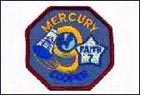|
Mercury Seven Astronaut Gordon "Gordo" Cooper on UFOs
By Carlton. W. Austin
It was 1963. Gordon Cooper, on one of the first extraterrestrial voyages of human history, was watching his fabulous blue, green and white home pass beneath him, starkly contrasted against the tableau of black, bottomless space. He sat in the cramped Mercury 9 capsule attending to flight duties, the chatter of mission control filling his helmet. Suddenly, a greenish object with a red tail st reaked by. reaked by.
A UFO?
That's the story repeated over the years by the likes of such UFO gurus as Allen Hynek and Jacques Valley. Trouble is, it just isn't true.
"No, somebody made a lot of money selling … lies on that one," Cooper, the sixth American in space, told Art Bell on his syndicated "Coast to Coast" radio show back in early September. "It was totally untrue, sorry to say."
But nonetheless, Cooper, one of the original "Mercury Seven" pilots, one of the guys with the "Right Stuff," according to Tom Wolfe in his book of the same name, has an "unshakable" belief in extraterrestrial life, including UFOs. And his conviction is based on personal experience.
"On one occasion, I saw some strange vehicles that we assumed were UFOs," he told Bell. Notice he used a very precise word: "vehicles."
The retired U. S. Air Force Colonel was a fighter pilot stationed in Germany in the early 1950s. One day, Cooper saw "flights of fighters flying by in the same sort of formation we flew, moving east to west." Cooper and his squadron mates were scrambled to go take a look; these objects represented a very real threat during these tense early days of the Cold War. Cooper told Bell he remembers the objects looking "just like saucers -- they were metallic looking, but we couldn't really get close enough to see more than that. You couldn't see any wings on them."
After returning to base, Cooper and the others speculated the craft might have been a new Soviet design, something that could entirely outclass them, something that would spell the end of Western air superiority, but "looking back now," he suspects "it was some kind of extraterrestrial vehicle."
Only a couple of years later, in 1957, at Edwards Air Force Base in California, Cooper swears he saw yet another UFO. At the time he was working with a film crew, which managed to get the episode on film. But a high-ranking officer from the Pentagon ordered the film confiscated before it was made public. Nothing has been seen of the film since.
Fast forward to his Gemini 5 mission. Cooper is in low-earth orbit. He has a camera again, and he's busily snapping pictures. But on his return, the authorities once again confiscate his film. What's going on? Well, it wasn't, as you may have heard from various reports of UFOlogists over the years, that the pictures were of the first alien spacecraft shadowing his capsule.
"I found out fairly recently that one of the reasons it got confiscated was I had inadvertently … overflown Area 51," while taking test photos, he said. Area 51 is the top-secret Nevada military base where it is rumored that captured UFO technology is being tested.
Bell asked Cooper directly what he thought about the famous Martian "face," the shadowy picture taken by the latest Mars probe that many claim to be evidence of previous Martian civilization. The former astronaut reflected for a moment but said only: "That's one of the reasons you need to send a manned mission to Mars, to study the stuff more closely."
Gordon Cooper is a man with the Right Stuff. He's an American hero. He's flown fighters, flown spacecraft, lectured the United Nations on the reality of UFOs. He believes. Along with Mulder and Scully and yours truly. "The truth is out there."
Read “In Appreciation of Gordon Cooper.”
|